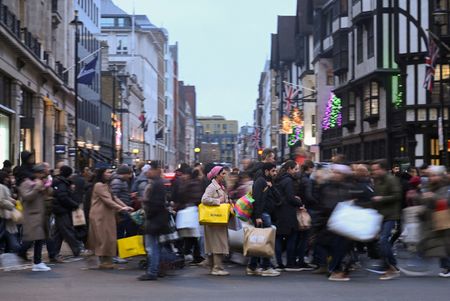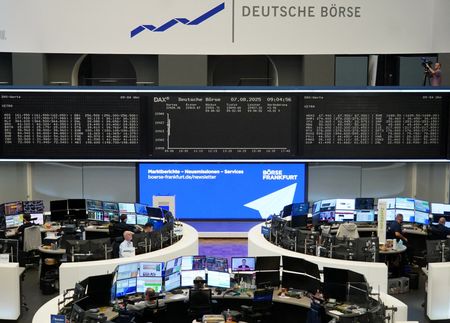By William Schomberg
LONDON (Reuters) – British retail sales rose in January for the first time since August and by much more than expected, according to official data that suggested consumers were happy to spend despite a weak outlook for the economy.
The 1.7% month-on-month gain in sales volumes was bigger than all estimates forecast in a Reuters poll of economists which had shown a median forecast for a 0.3% increase.
Sterling jumped by almost a fifth of a cent against the U.S. dollar after the figures were published by the Office for National Statistics on Friday.
Paul Dales, an economist with consultancy Capital Economics, said the figures suggested the retail sector “shot out of the blocks” in early 2025.
“But some of that strength will have come at the expense of weakness in other parts of the economy,” he said, pointing to strong growth in food sales which might have hurt the hospitality sector.
“And with households in a fairly glum mood, we doubt it will last,” Dales said.
A survey published earlier on Friday showed British consumers turned only a little less pessimistic this month.
Separate ONS data showed Britain ran a smaller-than-expected budget surplus in January, maintaining the prospect of further spending restraint or fresh tax increases by finance minister Rachel Reeves to stick to her targets for the public finances.
January’s monthly sales increase was the fastest since last May and marked a pickup after a sense of gloom about the economy last year was stoked by the new government of Prime Minister Keir Starmer in the run-up to Reeves’s first budget in October.
Retail sales volumes for the three months to January fell by 0.6% compared with the previous three months, reflecting the weakness at the end of last year.
Compared with a year earlier, retail sales in January were up by 1.0%, stronger than a median forecast for 0.6% growth.
Most of Britain’s major retailers, including Next and Marks & Spencer, have flagged a tougher year ahead as Reeves’ employer tax increases, and their potential impact on prices and employment, filter through into the economy.
Data published earlier this week showed inflation rose by more than expected in January while hiring and pay growth were also stronger than expected. However the Bank of England this month halved its forecast for economic growth in 2025.
It has said it will move gradually and carefully with further interest rate cuts.
Supermarket groups Sainsbury’s, Tesco and Morrisons have announced 3,600 job cuts in recent weeks.
(Writing by William Schomberg; Editing by Kate Holton and Susan Fenton)










